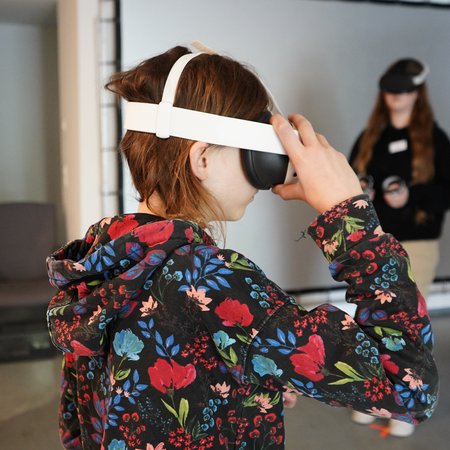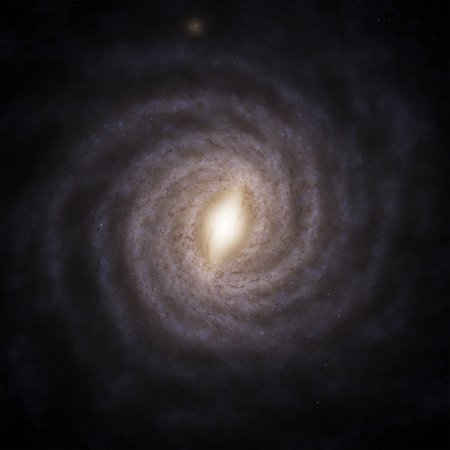A Broadened View of the Universe
An interview with Dr. Arianna Di Cintio, Karl Schwarzschild Fellow 2017, by the student Emma Dierkes, who did an internship in the PR & Public Outreach team of AIP.
What inspired you to become an astrophysicist?
Arianna Di Cintio: Ever since I was a kid I wanted to become either an astronaut or a ballerina. I still enjoy dancing a lot in my private life, mostly tango argentino, although it is not my career. And I discovered that I was too claustrophobic to become an astronaut. From that time on, I settled for being an astronomer. There is one memory that stuck with me from a boat trip that we took from Italy to Greece. I remember looking up at the stars, and thinking that this is what I want to study. The passion for astronomy was not something I was born with, but something I grew more and more attracted to.
What is your field of research?
I specialize in studying the formation of galaxies, through theoretical calculations and large cosmological simulations.
What are you researching at the moment?
At the moment I’m researching how a special class of galaxies form, which are called ultra diffuse galaxies. These are hard to understand, because they occupy a vast area in the sky while having very few stars. To understand how they form we have put forward a formation model. Based on our simulations they form due to repeated episodes of supernova explosions that lead to large outflows of gas leaving the galaxy. These drive the expansion of the stellar and the dark matter components, making the galaxy diffuse. Stars and dark matter together with the interstellar gas are the main components of a galaxy. Thus far these galaxies have been very difficult to find in the sky because they are faint. However, due to new telescopes and new techniques, we are now discovering many of these ultra diffuse galaxies.
What do you find fascinating about your research?
The mind set it puts me in. I wake up in the morning thinking about satellites or galaxies, my mind is always in the clouds somewhere. My friends are constantly thinking of more practical things like ‘I need to go to the bank’ or ‘I need to go grocery shopping’. I have to stop and think sometimes how lucky I am, that I get to learn about things beyond our planet. Aside from that, I love the freedom it affords me, in my research but also in travel. I get to meet astronomers from all over the world. I feel astronomy has broadened my view of the universe and of the people living in it.
What questions are you looking to answer through your research?
I want to find out how the universe formed and how galaxies form within the universe. Alongside that I would like to understand dark matter and its role in shaping galaxies. Finding dark matter is one of the most important open questions in astrophysics. There are hundreds of other questions I would love to answer, such as: What are the most important processes in the formation of galaxies? Is supernova feedback really important? What is the role of a black hole at the centre of a galaxy? How many faint galaxies are still out there yet-to-be discovered?
What are important attributes for an astrophysicist?
Firstly, you need to have a solid background in physics. I studied astrophysics and astronomy, and then I did my PhD in theoretical astrophysics. Secondly, you need to be persistent, in the sense that you‘re going to come across problems and unknowns constantly. In your PhD you learn where to look for solutions and how to find the answers to questions: you basically learn to be a problem solver, about any kind of problem you might be facing. Furthermore, it is very important to network to create collaboration opportunities. Collaborations offer many opportunities to share your work, get feedback on it, and also to meet new people to do new projects with.
If you could give one piece of advice to a student, hoping to be an astrophysicist or not, what would it be?
Do exactly what you wish to do. In high school many of my friends had dream jobs, but they questioned them because they thought there weren‘t many jobs in that field or their parents said that it was difficult to succeed in a specific field. However, I think that if you don‘t do something you love, you won‘t be able to work productively, you won‘t be happy. The job market is very competitive in every field, so you might as well go after a job that you want.
For astronomy in particular it‘s very important to study at a good university. When the time comes to do your PhD, it is also important that your supervisor is a well-established and recognized scientist in that specific field. Try and answer questions yourself before going to ask the professor. I remember when I studied in Italy, we were terrified of the professors, so we only asked questions we were sure didn‘t have an obvious answer.
What are tasks that you do as an astrophysicist that most people would not imagine an astrophysicist has to do?
A lot of bureaucracy. I didn‘t expect to have to do so much of that. You have to write a lot of grant applications and often you have to apply to get financial support for your projects. It ends up taking a lot of time away from research.
What do you enjoy about working at the AIP?
I enjoy the work environment, the people are very friendly and collaborative. Aside from that, the institute is beautiful. It has also the advantage that it covers a large variety of fields. You can easily access many experts and a great deal of information.
An interview with Dr. Arianna Di Cintio, Karl Schwarzschild Fellow 2017, by the student Emma Dierkes, who did an internship in the PR & Public Outreach team of AIP.
What inspired you to become an astrophysicist?
Arianna Di Cintio: Ever since I was a kid I wanted to become either an astronaut or a ballerina. I still enjoy dancing a lot in my private life, mostly tango argentino, although it is not my career. And I discovered that I was too claustrophobic to become an astronaut. From that time on, I settled for being an astronomer. There is one memory that stuck with me from a boat trip that we took from Italy to Greece. I remember looking up at the stars, and thinking that this is what I want to study. The passion for astronomy was not something I was born with, but something I grew more and more attracted to.
What is your field of research?
I specialize in studying the formation of galaxies, through theoretical calculations and large cosmological simulations.
What are you researching at the moment?
At the moment I’m researching how a special class of galaxies form, which are called ultra diffuse galaxies. These are hard to understand, because they occupy a vast area in the sky while having very few stars. To understand how they form we have put forward a formation model. Based on our simulations they form due to repeated episodes of supernova explosions that lead to large outflows of gas leaving the galaxy. These drive the expansion of the stellar and the dark matter components, making the galaxy diffuse. Stars and dark matter together with the interstellar gas are the main components of a galaxy. Thus far these galaxies have been very difficult to find in the sky because they are faint. However, due to new telescopes and new techniques, we are now discovering many of these ultra diffuse galaxies.
What do you find fascinating about your research?
The mind set it puts me in. I wake up in the morning thinking about satellites or galaxies, my mind is always in the clouds somewhere. My friends are constantly thinking of more practical things like ‘I need to go to the bank’ or ‘I need to go grocery shopping’. I have to stop and think sometimes how lucky I am, that I get to learn about things beyond our planet. Aside from that, I love the freedom it affords me, in my research but also in travel. I get to meet astronomers from all over the world. I feel astronomy has broadened my view of the universe and of the people living in it.
What questions are you looking to answer through your research?
I want to find out how the universe formed and how galaxies form within the universe. Alongside that I would like to understand dark matter and its role in shaping galaxies. Finding dark matter is one of the most important open questions in astrophysics. There are hundreds of other questions I would love to answer, such as: What are the most important processes in the formation of galaxies? Is supernova feedback really important? What is the role of a black hole at the centre of a galaxy? How many faint galaxies are still out there yet-to-be discovered?
What are important attributes for an astrophysicist?
Firstly, you need to have a solid background in physics. I studied astrophysics and astronomy, and then I did my PhD in theoretical astrophysics. Secondly, you need to be persistent, in the sense that you‘re going to come across problems and unknowns constantly. In your PhD you learn where to look for solutions and how to find the answers to questions: you basically learn to be a problem solver, about any kind of problem you might be facing. Furthermore, it is very important to network to create collaboration opportunities. Collaborations offer many opportunities to share your work, get feedback on it, and also to meet new people to do new projects with.
If you could give one piece of advice to a student, hoping to be an astrophysicist or not, what would it be?
Do exactly what you wish to do. In high school many of my friends had dream jobs, but they questioned them because they thought there weren‘t many jobs in that field or their parents said that it was difficult to succeed in a specific field. However, I think that if you don‘t do something you love, you won‘t be able to work productively, you won‘t be happy. The job market is very competitive in every field, so you might as well go after a job that you want.
For astronomy in particular it‘s very important to study at a good university. When the time comes to do your PhD, it is also important that your supervisor is a well-established and recognized scientist in that specific field. Try and answer questions yourself before going to ask the professor. I remember when I studied in Italy, we were terrified of the professors, so we only asked questions we were sure didn‘t have an obvious answer.
What are tasks that you do as an astrophysicist that most people would not imagine an astrophysicist has to do?
A lot of bureaucracy. I didn‘t expect to have to do so much of that. You have to write a lot of grant applications and often you have to apply to get financial support for your projects. It ends up taking a lot of time away from research.
What do you enjoy about working at the AIP?
I enjoy the work environment, the people are very friendly and collaborative. Aside from that, the institute is beautiful. It has also the advantage that it covers a large variety of fields. You can easily access many experts and a great deal of information.
Images
Dr. Arianna Di Cintio





